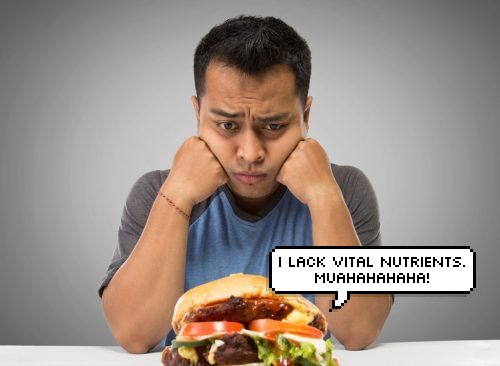Here's What Really Happens To Your Body When You Don't Eat Enough Fruits And Veggie
It even affects your mood!
Are you getting enough fruits and veggies every day?
We all know that fruits and vegetables offer many nutrients that are good for our overall health, but how many of us are actually consuming the recommended amount of at least five portions per day?
With our hectic lifestyles, it can be difficult to keep track of our daily fruit and vegetable needs.
But why are fruits and vegetables so important? Well, here's what happens to your body when you don't get enough of it:
1. You feel super bloated and uncomfortable
Fruits and vegetables provide much needed fibre to your body, and helps waste get pushed efficiently out of your colon. If you're not eating enough fruits, you'll likely experience excess gas, causing the dreaded feeling of bloating.
Too much salt in your diet also leads to bloating, but fruits that are packed with potassium and water can help counter this.
2. You aren't as happy as you could be
According to research, people who eat more fruits are actually happier! While the reason isn't 100% clear yet, experts believe fruits with Carotenoids and Vitamin B12 may boost serotonin in our brains, which is known as a "happy hormone."
3. Your immune system won't be as strong and you'll fall sick more often
Fruits and vegetables both provide antioxidants that not only help keep your skin healthy, they also fight overall inflammation throughout your body. So it's true what they say, an apple a day keeps the doctor away!
4. You'll miss vital nutrition you can't get elsewhere
Fruits contain some of the most vital nutrients for our health, eating too few can result in nutrient deficiencies:
- Lack of vitamin C can lead to weakness, irritability, and fatigue. In severe cases, you might even contract scurvy, which includes having bleeding gums!
- Lack of folate can lead to anemia
- Lack of vitamin B6 can lead to depression and confusion
- Lack of magnesium can lead to general weakness
- Lack of vitamin K can lead to hemorrhaging
- Lack of potassium can lead to irregular heartbeat
5. You may actually gain weight
Research in the US has shown that people who are overweight or obese eat less fruits and vegetables than normal-weight groups. If you're not eating fruits and veggies, is it because you're eating foods with higher fat content and calories? Fruits and vegetables are low in calories and energy density, which means you can eat more and feel full and happy with fewer calories.
6. You could develop digestive problems
We all know that fibre is essential to help push food through and prevent constipation. But did you know that the fibre found in fruits and vegetables also helps your body:
- Eliminate toxins
- Improve immune function
- Regulate appetite and blood sugar levels
- Reduce cholesterol
- Promote a healthy digestive system
7. Your blood pressure may rise
Fruits and veggies that are rich in potassium, calcium, and magnesium, help reduce the sodium in your diet, and thus lowering blood pressure. So to avoid turning into the Hulk, grab a tall glass of juice and drink it to the last drop!
8. You're at greater risk of getting heart diseases
On top of lowering your blood pressure, a study has revealed that people who eat 8 or more fruits and veggies a day are 30% less likely to have a heart attack or stroke.
9. You’re more likely to develop diabetes
Weight gain is commonly associated with diabetes. So if you're eating a lot of high-density foods instead of fruits and vegetables, and are gaining unhealthy amounts of weight, you could be at risk of getting Type 2 Diabetes. So put down the junk food and grab a fruit instead!
10. Your risk of cancer could increase
While there is no specific food that can protect you from cancer, a diet that includes antioxidants like Vitamin E, Vitamin C, and Carotenoids, may reduce cancer risks by protecting healthy cells from free radicals. You can get antioxidants from kale, blueberries, blackberries and more.
Of course, vitamins alone will not fully protect you and it's important to remember to continue leading a healthy lifestyle to lower your risk.
Ideally you should be getting at least two helpings of fruits and three helpings of vegetables a day. But that can be tough with your busy lifestyle, especially if you're not a fan either one!










